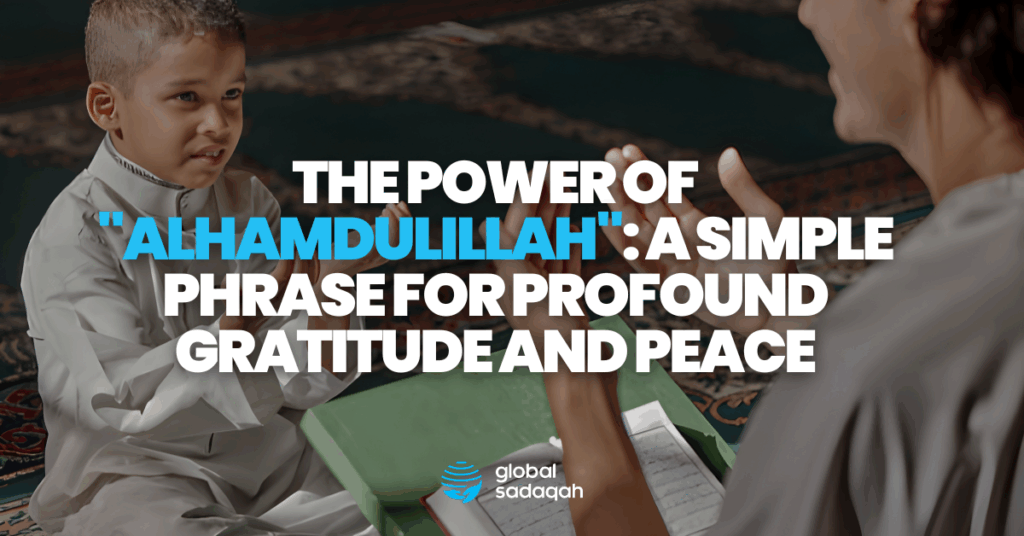In the constant, high-speed current of modern life, it is incredibly easy to feel overwhelmed, discontent, or focused on the things we lack. We are often unconsciously conditioned to chase the next achievement, the next possession, or the next moment of happiness. Yet, the key to profound inner peace and true satisfaction lies in a concept that is both ancient and profoundly simple: gratitude.
For billions around the world, this gratitude is encapsulated in one powerful, beautiful Arabic phrase: Alhamdulillah (الحمد لله).
Unpacking the Profound Meaning of “Alhamdulillah”
While commonly translated as “Thank God,” the spiritual and linguistic depth of Alhamdulillah is far richer. A more accurate understanding is: “All praise is due to God.”
This is not merely an expression of thanks for a specific gift—like saying “thank you” after receiving a compliment or a present. It is a comprehensive, holistic declaration that the Creator is deserving of all glorification, reverence, and gratitude, inherently and eternally.
- The Component of Hamd (Praise): This term implies perfection. When we say Alhamdulillah, we acknowledge that all beauty, all goodness, all power, and all perfection in the universe originates from, and belongs to, God alone. It is a recognition of His supreme nature.
- The Component of Al (The): The definite article makes the praise absolute and universal. It means the entirety of praise—not just some praise—is directed toward Him.
Therefore, when we utter Alhamdulillah, we are essentially confirming our belief in the perfection and unmatched generosity of our Creator, not just for what we have received, but for who He is.
The Three Transformative Roles of Gratitude
Embracing Alhamdulillah as a way of life has a transformative impact on our faith and emotional well-being, primarily through three vital roles:
1. The Anchor in the Storm: Gratitude in Hardship
Perhaps the most challenging, yet most spiritually rewarding, time to utter this phrase is during moments of difficulty, loss, or pain. When we face trials—be it illness, financial trouble, or the loss of a loved one—it can feel contradictory to offer praise.
However, saying “Alhamdulillah ‘ala kulli hal” (All praise is due to God in every circumstance) is not an act of denial of the pain; it is an act of profound faith and submission.
It signifies: “This situation is difficult, but my heart remains steadfast. I trust in the ultimate wisdom, mercy, and justice of God. I praise Him because I know He is in control, and this trial, too, serves a greater, benevolent purpose that will ultimately be good for me.” This deep-seated trust acts as a powerful anchor, preventing us from drifting into despair or feeling abandoned. It replaces questioning with certainty.
2. The Shield Against Envy and Discontent
In a world driven by comparison, it is easy to fall into the trap of looking at what others possess—their wealth, status, health, or gifts—and feeling a deep sense of lack or envy.
Alhamdulillah serves as the perfect spiritual shield against these corrosive feelings.
When we truly grasp that all blessings, whether ours or someone else’s, are gifts bestowed by the same, singular Source, the heart finds contentment. When we see someone successful, we can sincerely say, “Alhamdulillah for the good God has given them,” recognizing that our own portion is distinct, divinely chosen, and also deserving of praise. This simple shift directs our attention away from the finite blessings of others and back to the infinite generosity we personally receive every second. It fosters a heart of peace, not competition.
3. The Invitation for Increase and Growth
Gratitude is not just a polite social custom; it is a fundamental spiritual transaction. In a well-known divine promise, it is emphasized that thankfulness leads directly to an increase in blessings:
“If you are grateful, I will certainly give you increase, but if you are ungrateful, My punishment is severe.” (Qur’an 14:7)
This is a powerful incentive. Saying Alhamdulillah is not the end of the blessing; it is the completion of it. By acknowledging the gift, we show that the gift has been received well and appreciated, making us worthy recipients of further generosity. This principle extends beyond material wealth; it applies to an increase in faith, peace, wisdom, and inner strength. Gratitude opens the floodgates to more good.
Practical Ways to Weave “Alhamdulillah” Into Your Daily Fabric
To truly benefit from this phrase, we must transition it from a spontaneous reflex into a deeply mindful, consistent practice.
- The Moment of Awakening: Let your very first conscious thought be a declaration. As you feel the warmth of your covers or hear the sounds of a new day, pause and say, Alhamdulillah. This sets the tone for a grateful day, acknowledging the precious gift of life and health.
- The Ritual of Consumption: After every meal, every drink of water, or even a simple sip of coffee, take a moment to say Alhamdulillah. It transforms the mundane act of eating into an intentional act of worship, reminding you that your sustenance comes directly from God’s provision.
- When Your Plans Succeed: When a project goes well, you land that job, or you reach a destination safely, resist the urge to attribute the success solely to your own effort. Say Alhamdulillah, recognizing that your ability, your timing, and the favorable outcome were all facilitated by divine permission.
- When You See Others: Instead of letting your eye linger on someone’s possessions with envy, internalize Alhamdulillah. Be grateful for the health and safety you currently have, protecting your heart from negativity and affirming that all goodness is distributed by God.
Alhamdulillah—it is the language of the satisfied soul. It is the acknowledgement of the divine source of all good, and the ultimate key to living a life rich in contentment, purpose, and peace.

